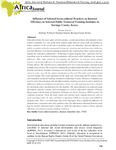Influence of Selected Socio-cultural Practices on Internal Efficiency in Selected Public Technical Training Institutes in Baringo County, Kenya
Abstract
Education forms the basis upon which economic, social and political development of any
nation is founded. It is one of the basic human rights that are universally proclaimed as
many countries in the world aim at attaining equity in education. Internal efficiency in
public secondary schools is measured by drop out, retention and transition rates. In Kenya,
internal efficiency in technical training institutions has remained low thus raising concerns
among the education stakeholders. In Baringo County dropout rates, repletion and low
transition rates in technical training institutions still persists which indicates low internal
efficiency. This study aimed at investigating the influence of selected socio-cultural
practices on internal efficiency in selected public technical training institutions in Baringo
County, Kenya. The selected socio- cultural practices were early marriages, moranism and
nomadic pastoralism. The researcher adopted the production function theory which asserts
that the institutions of higher learning act as the firm that processes the inputs (students at
entry) to come out with the outputs (graduates) at the end. The study used correlational
research design. The target population in the study was 2 principals and 95 students in the
selected public technical training institutions in Baringo County. Purposive sampling was
used to select the principals and stratified random sampling was used to select students in
different certificate and diploma programmes. Data was collected using interview schedule
for principals and a questionnaire for the students. The data obtained was analysed using
descriptive statistics (means and percentages) as well as inferential statistics (Poisson
Regression) with the help of Statistical Packages for Social Sciences (SPSS version 22)
computer program. From the study results the selected socio-cultural practices such as
early marriages had a P value of 0.014 on repetition, 0.008 on transition and 0.0018 on
dropout rates. This is an indication that early marriages had a significant influence on
dropout rates, transition rates and repetition rates.The information obtained from the study
may be used by education policy makers to ratify the education system to ensure internal
efficiency in technical training institutes in Kenya.

